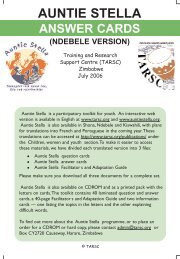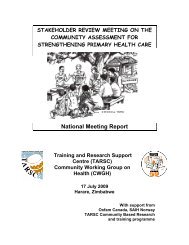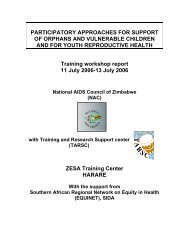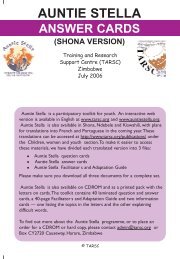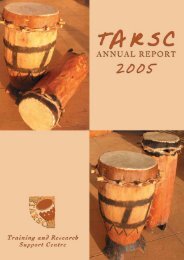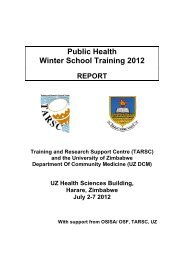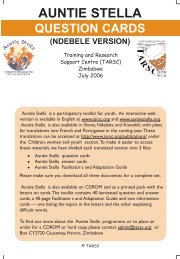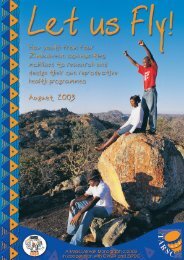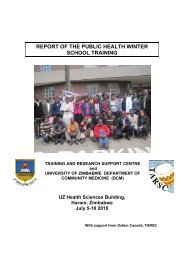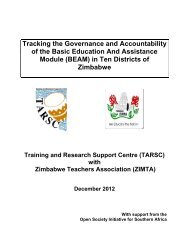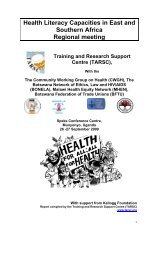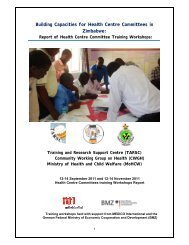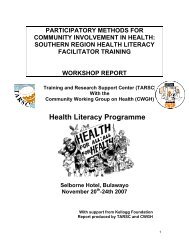WS07 REPORT.pdf - Training and Research Support Centre
WS07 REPORT.pdf - Training and Research Support Centre
WS07 REPORT.pdf - Training and Research Support Centre
You also want an ePaper? Increase the reach of your titles
YUMPU automatically turns print PDFs into web optimized ePapers that Google loves.
An Introduction to public health<br />
2.2 Introduction to epidemiology <strong>and</strong> public health<br />
Dr Rene Loewenson TARSC, gave a general introduction to the principles of public<br />
health <strong>and</strong> key concepts in epidemiology <strong>and</strong> how they are used in public health. She<br />
defined public health, <strong>and</strong> outlined using examples from Zimbabwe the basic elements<br />
of public health, the measures <strong>and</strong> concepts in epidemiology, how the data is collected<br />
<strong>and</strong> used <strong>and</strong> how it is applied to address public health.<br />
2.3 Epidemiology of HIV <strong>and</strong> AIDS: Current situation.<br />
Dr A Mahomva (Elizabeth Glazier Pediatric HIV <strong>and</strong> AIDS Foundation ) gave an outline<br />
of the epidemic pattern of HIV <strong>and</strong> AIDS: the transmission mechanisms <strong>and</strong> natural<br />
history of AIDS <strong>and</strong> the trends globally <strong>and</strong> in Zimbabwe of the epidemic. She informed<br />
delegates of the distribution <strong>and</strong> determinants of HIV, <strong>and</strong> the current levels <strong>and</strong> trends<br />
in the HIV <strong>and</strong> AIDS epidemic through prevalence, incidence <strong>and</strong> mortality data. She<br />
used the evidence to describe patterns of vulnerability <strong>and</strong> susceptibility in HIV <strong>and</strong> AIDS<br />
<strong>and</strong> the major public health challenges this raises <strong>and</strong> the opportunities for responses.<br />
2.4 HIV <strong>and</strong> AIDS Prevention, treatment <strong>and</strong> care.<br />
Dr T R Bwakura, a Specialist physician ( Ministry of Health OI Clinic) outlined the options for<br />
prevention, treatment <strong>and</strong> care for HIV <strong>and</strong> AIDS, as well as for opportunistic infections. He also<br />
outlined the current options for Antiretroviral treatment (ART) <strong>and</strong> the issues related to<br />
managing treatment <strong>and</strong> care in Zimbabwe.<br />
2.5 Epidemiology <strong>and</strong> management of TB <strong>and</strong> Malaria<br />
Dr C Duri (Harare City Health Department) outlined the current distribution of<br />
Tuberculosis (TB) in Zimbabwe, its distribution <strong>and</strong> causes. His presentation explored<br />
that TB is, <strong>and</strong> what TB infection is, the major sources of TB infection <strong>and</strong> the<br />
progression from infection to disease. He outlined the current TB trends including the<br />
new XDR strains <strong>and</strong> how TB can be controlled <strong>and</strong> managed, making clear the roles of<br />
communities <strong>and</strong> health services.<br />
On Malaria, Dr J Chirenda UZ DCM provided information on the epidemiology of<br />
malaria, the burden of malaria, <strong>and</strong> its transmission in Africa, Zimbabwe. He discussed<br />
with delegates the burden posed by malaria on health systems, on households <strong>and</strong> local<br />
economies <strong>and</strong> how these can be prevented <strong>and</strong> dealt with. Dr J Chirenda gave a<br />
practical presentation on experiences of managing malaria.<br />
Both sessions outlined <strong>and</strong> discussed the steps to establish a community approach to<br />
TB <strong>and</strong> Malaria management with participants.<br />
2.6 Nutrition <strong>and</strong> food security: issues <strong>and</strong> multisectoral responses<br />
Mr F Makamba University of Zimbabwe department of food science gave a lecture on<br />
nutrition, defining terms <strong>and</strong> outlining the major elements of individual, household, <strong>and</strong><br />
national food needs, how these are met <strong>and</strong> the elements of malnutrition. He outlined<br />
the impact of HIV <strong>and</strong> AIDS on nutrition <strong>and</strong> the nutritional requirements for PLWHA. He<br />
presented the national policies for food security <strong>and</strong> nutrition <strong>and</strong> how the interventions<br />
on nutrition interact with wider health <strong>and</strong> social issues. There was active discussion on<br />
this issue, particularly on issues relating to community level <strong>and</strong> to nutrition issues facing<br />
people living with HIV <strong>and</strong> AIDS.<br />
4




